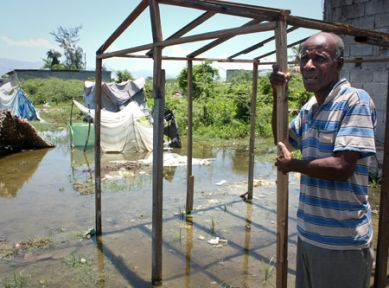Haiti 'No. 1 Concern' as Hurricane Season Approaches

The Caribbean nation of Haiti, which has just started its recovery from January's massive 7.0 earthquake, is high on the list of countries facing danger in the upcoming hurricane season, officials say.
U.S. National Hurricane Center director Bill Read expressed his concern on Tuesday over the vulnerability of the one million people who are still living in tents after the Jan. 12 quake, which killed some 200,000 people.
"My number one concern this year is Haiti," Read told Reuters. "We have the potential for another catastrophe there."
Along with the lack of shelters, Haiti is particularly vulnerable to flooding as much of the country has been deforested and stripped of vegetation.
Concerned about a potential "secondary disaster" in Haiti, relief group World Vision is currently urging the Haitian government and the international community to include disaster risk reduction activities into their long-term rebuilding plans.
"While we continue to focus on the earthquake relief efforts in Haiti, we must prepare ourselves for the possibility of another disaster as the hurricane season approaches," said Jean-Claude Mukadi, World Vision's relief response manager in Haiti. "While we can't prevent disasters like earthquakes and floods, we must focus on preventing the effects of these disasters on those at risk in Haiti."
For World Vision, adequate preparation for the hurricane season could not only save hundreds, if not thousands, of Haitian lives, it could also save donors and investors that much money as well.
According to the group, studies have shown that the economic cost of investing in disaster preparedness and disaster risk reduction is far less than the cost of dealing with the aftermath. Some estimate that for every dollar spent on risk reduction, at least four dollars are saved.
World Vision is now lobbying those involved in Haiti's reconstruction effort to set aside a minimum of 10 percent of humanitarian funds for disaster risk reduction interventions.
The group has also implemented cash-for-work programs in its camps in Port-au-Prince, paying men and women to build and maintain latrines and bathing facilities, dig trenches in the camps to help ease the effects of heavy rains, and reinforce the temporary shelters with new tarps and poles.
"We know disaster risk reduction can save lives; we saw it work in Bangladesh after Cyclone Sidr struck in 2007. Sadly, that cyclone killed 3,400 people, but an equally-powerful cyclone there in 1991 killed more than 143,000 Bangladeshis," said Melisa Bodenhamer, World Vision's senior advisor on disaster risk reduction.
"Today in that country, communities are more prepared in the event that another catastrophic event like that should occur. It is our hope that by implementing similar disaster risk reduction activities, Haiti will see the same success in the years to come."